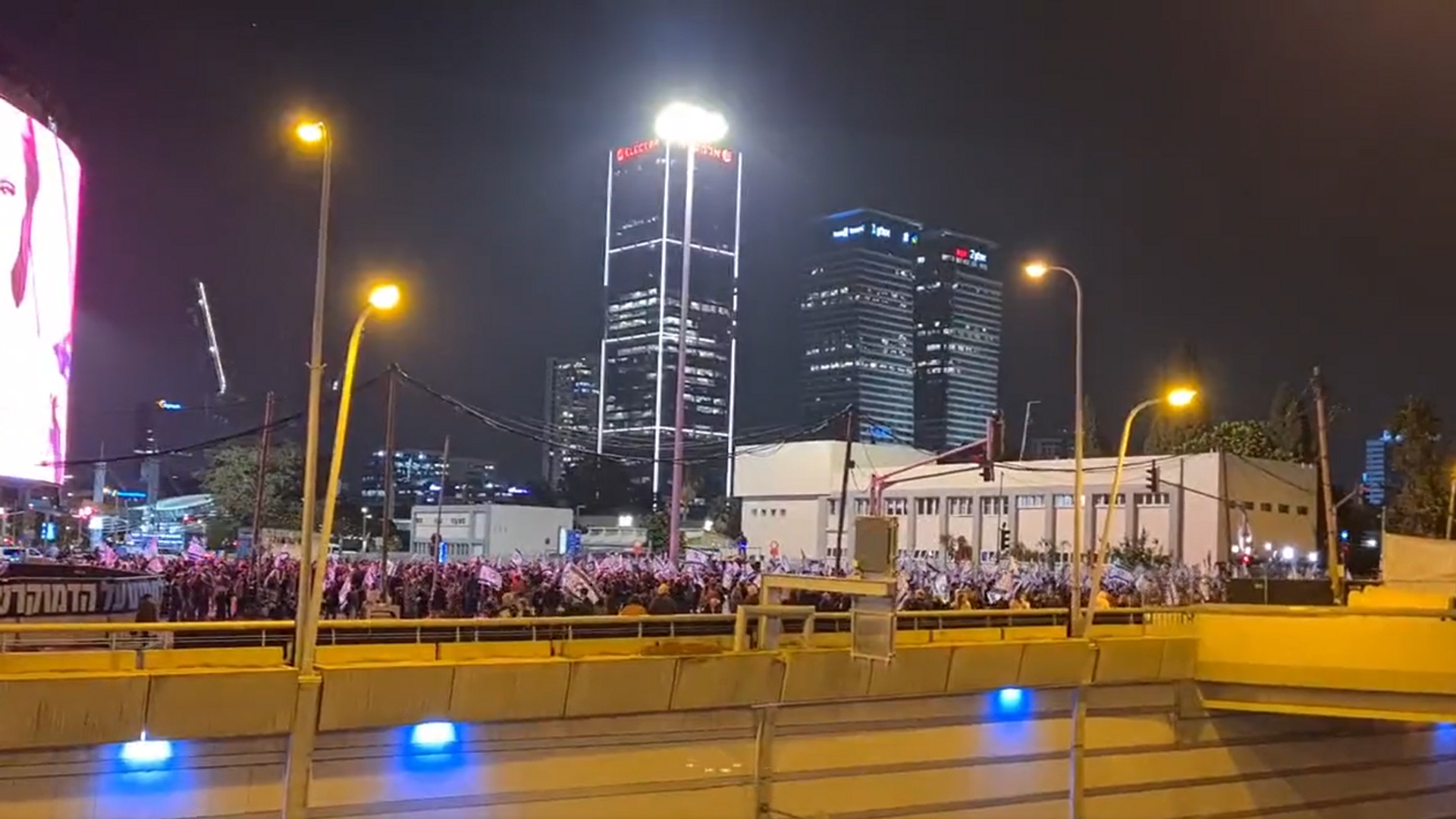https://sputnikglobe.com/20230311/protests-against-judicial-reform-in-tel-aviv-1108284270.html
Protests Against Judicial Reform in Tel Aviv
Protests Against Judicial Reform in Tel Aviv
Sputnik International
Sputnik goes live from Tel Aviv, as thousands of protesters gather to rally against Prime Minister Benjamin Netanyahu and his government for the tenth week in a row.
2023-03-11T16:27+0000
2023-03-11T16:27+0000
2023-03-11T16:27+0000
world
israel
protests
https://cdn1.img.sputnikglobe.com/img/07e7/01/15/1106561772_52:0:1314:710_1920x0_80_0_0_360e4cf6145ca11f5fc5d724301173a0.png
Sputnik comes live from Tel Aviv, as protesters gather to rally against Prime Minister Benjamin Netanyahu and his government for the 10th week in a row.In January, Israeli Justice Minister Yariv Levin rolled out a legal reform package that would limit the authority of the Supreme Court by giving the cabinet control over the selection of new judges, as well as allowing parliament to override the court's rulings with an absolute majority. The reform's opponents argue it will undermine democracy in Israel and put the country on the verge of a social and constitutional crisis.On 1 March, the Constitution, Law and Justice Committee of the Israeli parliament, the Knesset, approved the second part of a controversial judicial reform pushed by the Israeli government, which would limit the Supreme Court’s authority, amid widespread protests in the countryThe current Israeli judicial system has been in place since the establishment of the state in 1948. In accordance with this system, the Supreme Court provides constitutional oversight, since Israel does not have a constitution or a constitutional court. Government decisions are largely controlled by the Supreme Court, which can overrule them if necessary.Follow Sputnik's Live Feed to Find Out More!
israel
Sputnik International
feedback@sputniknews.com
+74956456601
MIA „Rossiya Segodnya“
2023
Sputnik International
feedback@sputniknews.com
+74956456601
MIA „Rossiya Segodnya“
News
en_EN
Sputnik International
feedback@sputniknews.com
+74956456601
MIA „Rossiya Segodnya“
Protests Against Judicial Reform in Tel Aviv
Sputnik International
On 4 January, Israeli Justice Minister Yariv Levin rolled out a legal reform package that would limit the authority of the Supreme Court by giving the cabinet control over the selection of new judges, as well as allowing the Knesset to override the court's rulings with an absolute majority - among other things.
2023-03-11T16:27+0000
true
PT146M47S
Sputnik International
feedback@sputniknews.com
+74956456601
MIA „Rossiya Segodnya“
prime minister benjamin netanyahu, judicial reform
prime minister benjamin netanyahu, judicial reform
Protests Against Judicial Reform in Tel Aviv
On 4 January, Israeli Justice Minister Yariv Levin rolled out a legal reform package that would limit the authority of the Supreme Court by giving the cabinet control over the selection of new judges, as well as allowing the Knesset to override the court's rulings with an absolute majority - among other things.
Sputnik comes live from Tel Aviv, as protesters gather to rally against Prime Minister Benjamin Netanyahu and his government for the 10th week in a row.
In January, Israeli Justice Minister Yariv Levin rolled out a legal reform package that would limit the authority of the Supreme Court by giving the cabinet control over the selection of new judges, as well as allowing parliament to override the court's rulings with an absolute majority. The reform's opponents argue it will undermine democracy in Israel and put the country on the verge of a social and constitutional crisis.
On 1 March, the Constitution, Law and Justice Committee of the Israeli parliament, the Knesset, approved the second part of a controversial judicial reform pushed by the Israeli government, which would limit the Supreme Court’s authority, amid widespread protests in the country
The current Israeli judicial system has been in place since the establishment of the state in 1948. In accordance with this system, the Supreme Court provides constitutional oversight, since Israel does not have a constitution or a constitutional court. Government decisions are largely controlled by the Supreme Court, which can overrule them if necessary.
Follow Sputnik's Live Feed to Find Out More!


